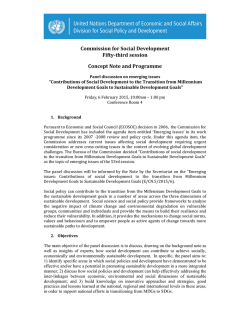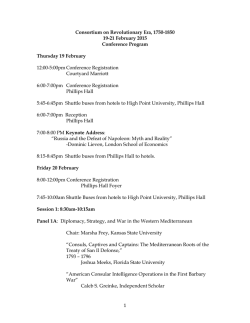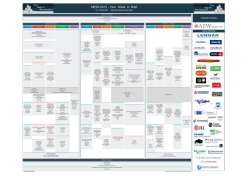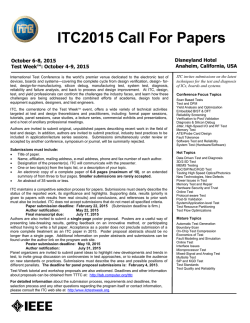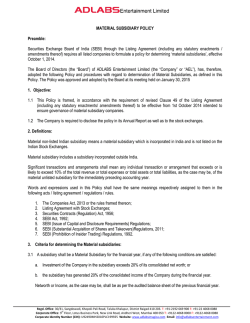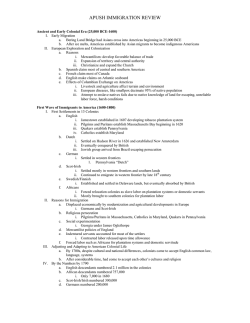
Case Processing Panel Information Note
Information Note Case Processing Panel Member Irish Naturalisation and Immigration Service (INIS) and the Office of the Refugee Applications Commissioner (ORAC) The Irish Naturalisation and Immigration Service and the Office of the Refugee Applications Commissioner are committed to a policy of equal opportunity. The closing date for this competition is Thursday, 19th February 2015 at 17:00. Completed applications should be forwarded by email to [email protected]. Applications received after the closing date and time will not be accepted. If you have any queries in relation this competition please contact INIS on 01 6478655 between 9:30 a.m. and 5 p.m., or by email [email protected]. 1 Case Processing Panel Member Irish Naturalisation and Immigration Service and the Office of the Refugee Applications Commissioner 1. Background Irish Naturalisation and Immigration Service The Irish Naturalisation and Immigration Service (INIS) was established in 2005 in order to provide a “one stop shop” in relation to asylum, immigration, residency, citizenship and visas. The INIS is responsible for the policy and administrative functions of the Minister for Justice and Equality in relation to these matters. The INIS also facilitates a whole of government approach to immigration and asylum issues which enables a more efficient service to be provided in these areas. Office of the Refugee Applications Commissioner The Office of the Refugee Applications Commissioner (ORAC) was established in November 2000 as a statutorily independent office to, inter alia, consider applications for refugee status and to make recommendations to the Minister on whether such status should be granted. The Office is also responsible for determining whether a protection application should be transferred to another Member State under the EU Dublin III Regulation. Since November 2013, ORAC investigates and prepares reports for the Minister for Justice and Equality on applications for subsidiary protection. The Commissioner may also be represented at an appeal hearing at the Refugee Appeals Tribunal against a negative recommendation at first instance in respect of an application for refugee status or subsidiary protection or in relation to a transfer decision under the EU Dublin III Regulation. Repatriation Division (INIS) The Repatriation Division of INIS considers whether, under Section 3 of the Immigration Act, 1999 as amended, a deportation order should be made in respect of a person refused refugee or subsidiary protection status or whether leave to remain should be granted instead. The Division also deals, to a lesser extent, with cases of persons found to be illegal in the State and with requests to revoke deportation orders. Case Processing work. Case processing work in both ORAC and INIS is complex and is governed by a strict constitutional and domestic statutory framework including a substantial number of judgments of the Superior Courts, as well as adherence to international (including EU) legal instruments to which the State is a party. Case Processing Panel. To enable INIS and ORAC to carry out their functions to optimum effect and to assist in the reduction of caseloads, the current Case Processing Panel of Legal Graduates (established in 2013) is being expanded and its remit extended to process applications for refugee status and to carry out other support work. 2 The role and functions of INIS and ORAC outlined above will change later in 2015 in the context of a planned new legislative framework under development, which will see the introduction of a single procedure. Subject to the necessary approvals, it is envisaged that the panel will process cases under a single procedure. 2. REQUIREMENTS The Case Processing Panel Applications are invited from persons to be assigned to a Case Processing Panel. The functions of the Panel are set out in section 3 of this Information Note. The Panel will be located at a Dublin City location. Essential requirements for inclusion on the Panel On or before Thursday, 19th February 2015, applicants should (a) Hold an Honours Bachelor Degree (Level 8 National Framework of Qualifications) with minimum grade 2.2 in which Law is a single or joint major or Have been called to the Bar, or Have been admitted and be enrolled as a Solicitor in the State. and (b) Have proven research, drafting and report writing skills. Have a qualitative approach to work and the capability to produce well researched submissions. and Be available to process case files when required. (c) Desirable attributes (i) Have a thorough knowledge/experience of Irish asylum and refugee law (including EU/international aspects). (ii) Have a thorough knowledge/experience of the law in Ireland in relation to subsidiary protection (including EU/International aspects), immigration, and Leave to Remain. (iii) Have the ability to work to deadlines and to achieve targets. (iv) Have a high degree of interpersonal effectiveness. (v) Have the ability to work on own initiative and to take direction as required. (vi) Have excellent communication and teamwork skills. (vii) Have an ability to use information technology, including a laptop computer. 3 3. Detailed Tasks and Responsibilities The functions of members of the Panel will include examining individual files assigned to them, carrying out the necessary research, considering documentation on file including any representations submitted, having regard to the provisions of the Refugee Act 1996, the European Union (Subsidiary Protection) Regulations, 2013 and the Immigration Act 1999, (as amended) and any other relevant legislation and case law; carrying out interviews with applicants for refugee status under the Refugee Act, 1996, (as amended) and following the interview, preparing a detailed synopsis/report of the main issues raised at the interview; interviewing applicants for subsidiary protection under the European Union (Subsidiary Protection) Regulations, 2013 (and amendments thereto) and producing a reasoned, balanced and legally robust report to an authorised officer; producing a reasoned, balanced and legally robust report/submission to an officer of the Minister on cases to be considered under Section 3 of the Immigration Act, 1999; representing the Refugee Applications Commissioner at appeal hearings in respect of applications for refugee status and subsidiary protection and transfer decisions under the EU Dublin III Regulation at the Refugee Appeals Tribunal, 6-7 Hanover Street, Dublin 2. This work will be subject to specified terms and conditions and the quality of work will be supervised by management. Panel members may be required to carry out some or all of the above functions as required by INIS or ORAC in line with the relevant statutory framework. Persons appointed to the Panel will be paid on the basis of a fee per completed task, based on the fees set out in the Annex. All work submitted by members of the Panel will be subject to a quality assessment before payment is made. Persons, appointed to the Panel, must fully respect the confidential nature of the immigration and asylum processes. Subject to the number of candidates applying, applicants may be short-listed in advance and may be interviewed. Persons appointed to the Panel will not be Civil Servants or employees of the State. Closing date for receipt of applications: Thursday 19th February, 2015 at 17:00. Applications received after the closing date will not be accepted. Canvassing will disqualify. 4 4. Principal Conditions of Service General Panel members will be subject to the Civil Service Code of Standards and Behaviour. Payment will only be made on completion of the tasks assigned in line with the relevant statutory framework and subject to quality approval. Schedule of Fees Different fees apply depending on the nature of the functions undertaken, namely Refugee Determination process. Subsidiary Protection process. Section 3 of the Immigration Act 1999 process. Details of fees are outlined in the Annex to this document. Duties Persons appointed will be required to perform any duties assigned to them from time to time as appropriate to the position. Additional matters to note Successful candidates will be required to sign an agreement/contract for services in relation to the terms and conditions of the appointment. The agreement will be subject to a probationary period of 3 months, after which the contract for services will either be confirmed or discontinued. It is a condition of membership of the Panel that a Panel member must provide the contracted services personally on INIS/ORAC premises. Sub-contracting of work is not permitted. Failure to meet the terms and conditions may result in removal from the panel. It is intended that this Panel will run for an initial period of 12 months from the date of commencement. Subject to ongoing requirements, the Minister for Justice and Equality reserves the right to extend the term of the Panel, to renew membership of the Panel or to terminate the operation of the Panel. Payment, on a case completed basis, will be at the rate outlined in the Annex, regardless of the length of time taken to complete the task assigned to the panel member and whether this involves the completion of an interview, the preparation of a report/submission, or representing the Commissioner at an appeal hearing, subject to any quality system approval. National taxation obligations will apply and payments to Members of the Panel will be subject to the provisions of the Revenue Commissioners Code of Practice for Determining Employment or Self-Employment for individuals, dated June, 2010 or any subsequent amendments in this regard. Panel members should be in a position to process a minimum of three case files per week. The identity of each applicant on file is protected under the Refugee Act, 1996, and other relevant legislation, including the provisions of data protection law. Contact details and mobile number must be provided to INIS or ORAC management. 5 Persons appointed will be required to provide availability details to INIS or ORAC four weeks in advance. Panel members may be required to attend for the processing of cases at short notice. It will be at the discretion of INIS or ORAC management to assign cases to members of the panel and membership of the panel carries no entitlement to any work or to a minimum or maximum level of work. The work venue will be at a Dublin City location. Travel and subsistence expenses are not payable. A Panel Member will be required, in the course of his/her work for INIS or ORAC, to abide by the policies and procedures of INIS or ORAC and its agencies with regard to customer service including internet, phone and e-mail policies and any policy or procedure that INIS or ORAC may introduce over the lifetime of the Processing Panel. A Panel Member will be required to provide evidence of tax compliance before being accepted on to the Panel. A Panel member will be required to consent to the Garda Vetting process being carried out. No car parking facilities will be available. Training Panel members will be required to undertake any training (including refresher training) as required by INIS or ORAC. There will be no fee payable to a member of the panel for training undertaken. Attendance at training will be at a candidate’s own expense. Satisfactory completion of training (as determined by INIS or ORAC) will be a necessary requirement before being appointed to the Panel. Outside Employment and conflicts of interest It is a condition of membership of the Panel that a Panel member does not engage in actions which give rise to or may give rise to a conflict of interest. In this regard, it is considered that a conflict of interest arises where a Panel member is involved in advising or representing persons in the asylum, subsidiary protection or leave to remain process during the period they are assigned to the Panel. Applicants and Members of the Panel must inform INIS or ORAC if they are engaged in or intend to engage in other work associated with INIS or ORAC or other bodies involved in the asylum and immigration process. Conflicts or potential conflicts of interest should be declared to INIS or ORAC Management immediately. Official Secrecy and Integrity A Panel Member will be subject to the Official Secrets Act, 1963 as amended and to the Ethics in Public Office Acts, 1995 and 2001. Confidentiality A panel member must fully respect the confidential nature of the immigration and asylum process. 6 5. Selection Process Selection methods The method used to select a successful candidate for this Panel may include: Shortlisting of candidates on the basis of the information contained in their application. At the discretion of INIS or ORAC and subject to the number of applicants applying, an interview for shortlisted applicants For the purpose of the shortlisting exercise, it will be in the candidate’s interest to provide a detailed and accurate account of qualifications/experience in their application form. In the event that a large number of candidates meet the essential eligibility requirements for panel members and INIS/ORAC decide to invite a smaller number to interview, this is not to suggest that other candidates are necessarily unsuitable or incapable of processing the cases assigned rather that there are some candidates who are, prima facie, better qualified and/or have more relevant experience. INIS/ORAC may also establish a reserve Panel. The onus is on all candidates to make themselves available for interview (should that method be employed) on the date(s) specified by INIS/ORAC and to make whatever arrangements are necessary to ensure that they receive communications sent to them at the contact details specified on their application form. Completing the Application Form Applications must be made on the official application form and will be treated in strict confidence. All sections of the form must be fully completed. When completing the application form accuracy is essential, as it will be used for shortlisting candidates, should the need arise. It is therefore in the candidate’s interest to ensure that the information supplied in all sections is correct. If it is necessary to continue on a separate sheet, please set the information out in the same manner as in the application form. The acceptance of this application does not imply that INIS is satisfied that such person fulfils the requirements of the selection process and does not carry a guarantee that such application will receive further consideration. It is important to note that the onus is on the candidate to ensure that the eligibility requirements for the competition are met before applying. Confidentiality Applications will be treated in the strictest confidence. 7 Closing date The completed application form must be forwarded by e-mail up to the closing date and time of Thursday 19th February, 2015, at 17:00. E-mail applications should be addressed to [email protected]. Applications received after the closing date and time will not be accepted. Obligations placed on candidates Candidates for appointment should note that canvassing will disqualify and will result in their exclusion from the process. Candidates must not: Knowingly or recklessly provide false information. Canvass any person with or without inducements during the course of the application process. Impersonate another person or candidate at any stage of the process. Interfere with or compromise the process in any way. Deeming of application to be withdrawn Candidates, who do not attend for interview when and where required by INIS/ORAC, or who do not, when required, furnish such evidence, as INIS/ORAC requires in regard to any matter relevant to their application, will have no further claim to consideration. Candidates, who, in the view of INIS/ORAC, do not satisfactorily complete the required training programme, will be deemed to be ineligible to join the Panel. Data Protection Act 1998 and 2003 When an application form is received, a computer record is created in the candidate’s name, which contains most of the personal information supplied. This personal record is used solely for the purpose of processing an application. Such information held on computer is subject to the rights and obligations set out in the Data Protection Act, 1998 and 2003. A candidate is entitled under the Acts to obtain, at any time, a copy of the information held, which is kept on computer. 8 Annex. Schedule of fees. Refugee Determination Process Nature of function Fee To interview the principal applicant for refugee status at first instance, and following the interview, the €230 preparation of a detailed synopsis/report of the main issues raised at the interview. To interview the partner/spouse of a principal applicant at first instance, and following the interview, the €140 preparation of a detailed synopsis/report of the main issues raised at the interview. To interview, where necessary, a dependant child of the principal applicant at first instance and following €45 the interview, the preparation of a detailed synopsis/report of the main issues raised at the interview. To represent the Commissioner at an appeal hearing at the Refugee Appeals Tribunal where an appeal has been lodged by a principal applicant. €195 To represent the Commissioner at an appeal hearing at the Refugee Appeals Tribunal where an appeal has €140 been lodged by a partner/spouse of a principal applicant. 9 Subsidiary Protection Process Nature of function Fee To interview the principal applicant for subsidiary protection at first instance and to prepare the necessary €330 written report in respect of a principal applicant. To interview a partner/spouse of a principal applicant at first instance in respect of their own application €195 and to prepare the necessary written report in respect of that person. To interview, where necessary, a dependant child of the principal applicant at first instance and to prepare €45 the necessary written report in respect of that child. To represent the Commissioner at an appeal hearing at the Refugee Appeals Tribunal where an appeal has €195 been lodged by a principal applicant. To represent the Commissioner at an appeal hearing at the Refugee Appeals Tribunal where an appeal has €140 been lodged by a partner/spouse of a principal applicant. 10 Section 3 of the Immigration Act 1999 process Nature of function Fee For completion of a report in respect of a principal applicant. €165 For completion of a report in respect of a spouse/partner of a principal applicant. €85 For completion of a report in respect of a dependant child of a principal applicant. €45 11
© Copyright 2026
